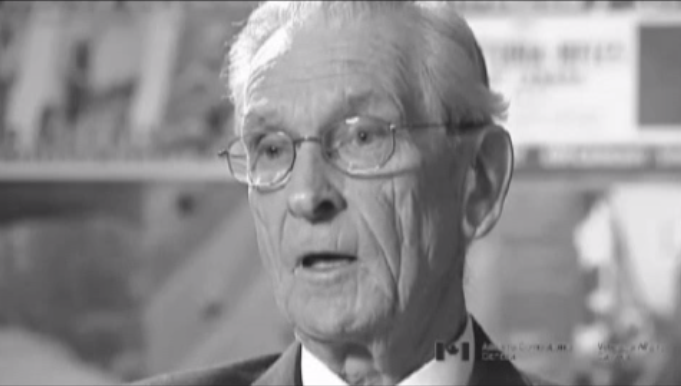J’ai été instructeur dans l’Armée
La force francophone
J’ai été instructeur dans l’Armée
Transcription
J'AI ÉTÉ INSTRUCTEUR DANS L'ARMÉE
J'ai fait mon entraînement et au bout de... c'était dans le mois de mai,
ou avril que j'ai fini mon entraînement et quatr' mois après...
quatr' à cinq mois après, j'ai au la promotion de lance caporal.
Là, j'ai tombé su' l'entraînement, j'ai resté là, su' l'entraînement.
On avait un peloton qui rentrait à tout' les deux mois. Fait que après deux mois,
on perdait notr' peloton, y en rentrait un autre dans la même journée. Ça, ça été pour
quatre ans. Et on avait les certains soldats qui venaient là, qui ne savaient pas lire ni écrire
et même compter leur... savoir comment compter leurs argents. Ça fait, eux, on les
gardait quatr' mois et on leur faisait l'école. Là, j'étais rendu que
j'enseignais d'autres qui ne savaient pas lire et écrire.
Ça m'donnait une joie de faire ça. Lorsqu'ils savaient lire et écrire,
ben y étaient transférés dans l'avancement, l'entraînement d'avancement.
Ceux qui étaient de cette condition, ni savoir lire et ni écrire,
c'était nos meilleurs soldats.
It was a little monotonous…four years on the same job, training
soldiers, giving them good basic training, seeing them leave and
then starting over. And I’ll tell you one thing: I even trained
my young brother, not Rodolphe but Vincent.
He was in the army, too. I trained him, he was in my
platoon. It was…it was a little hard for me, because you know in
the army, orders are orders. He had to do what the others were
doing. In the evening, I wasn’t around him more than I was the
others, and those were the army’s orders. Then, there were
those who, when conscription passed, didn’t want to join the
army. There were others, from the same platoon, who were
active, who had signed up, and that was a big contrast. It was
hard. There were those who wanted to and others who didn’t.
But, at the end, when they got their orders, it had to work.
It was better, but it took some time. Those of us in the army
didn’t notice that. We didn’t notice the conscription. We took
them for active soldiers. They were…the same training, under the
same orders, and it went well. The beginning was the worst.
You’d see that they didn’t want it like the 'active' soldiers.
The Place of Francophones in Your Regiment
Most of them came from the Acadian Peninsula. There were
English platoons, but I had the francophones. The training was in
English anyway because it was like that in the army…it was
English. But we gave explanations in French when we got together,
but the training – what was called drill – that was in
English, the commands were in English. The platoons were not
just the French. There were English there as well. There were
English in my platoons. But things went well. I never had any
difficulties, myself. I knew how to make myself liked. You had to
talk with them a lot in the hut, as we called it, in the evening.
I sat on the edge of their bed with them. We chatted because
there were quite a few who came from our area and everything, and
we had a lot to talk about. But the next morning, it was orders.
They were warned: it’s orders and that’s all. That’s how it
works. “We’re not against you, we are with you.” That’s the
reason that I was stuck...so to speak… that I didn’t go overseas,
because they didn’t have enough instructors. There were some in
our group who were transferred, who went overseas, but others had
to… I even had a letter one night, from a major, who wrote in
August 1944, I think, and it’s nice, the letter that he wrote me.
It was really nice. He told me, he thanked me for all the things
that we had done at the Edmundston camp and he was sorry
that my requests to go overseas had been cancelled because there
were so few instructors and it was hard to replace me. And at
the end, he thanked me and he said to me…wished me luck and it
was Major R.W. MacDonald, who was at the Edmundston camp,
who was a major.
Description
Léandre Blanchard nous parle de son travail au camp de recrues d’Edmundston.
Léandre Blanchard
Léandre Blanchard est né à Grande?Anse le 29 avril 1919. Il travaille sur la ferme de son père avant de s’enrôler. Après son instruction, on décide de le garder à Edmundston, où il devient instructeur pour les recrues. Il occupe ce poste pendant quatre ans. Il n’est jamais appelé au front. Le jour où la guerre se termine, M. Blanchard accompagne son épouse à l’hôpital, où elle donne naissance à leur premier fils.
Catégories
- Médium :
- Vidéo
- Propriétaire :
- Anciens Combattants Canada
- Durée :
- 6:44
- Personne interviewée :
- Léandre Blanchard
- Guerre ou mission :
- Seconde Guerre mondiale
- Emplacement géographique :
- Canada
- Branche :
- Armée
- Unité ou navire :
- North Shore Regiment
- Occupation :
- Instructeur
Continuer à regarder
- Date de modification :



